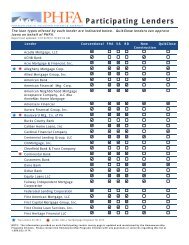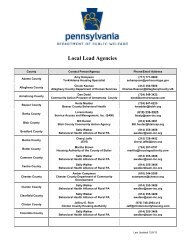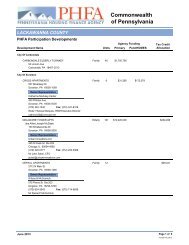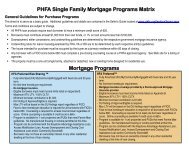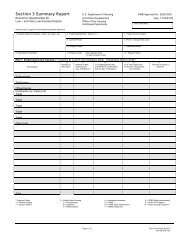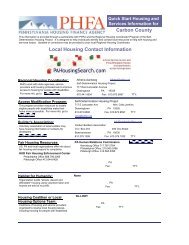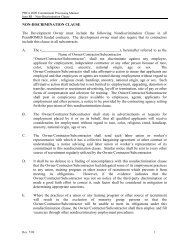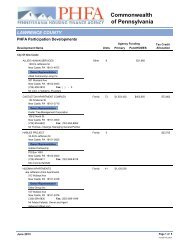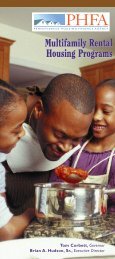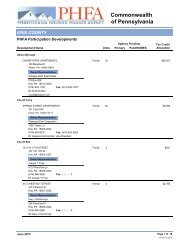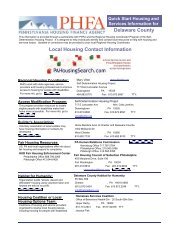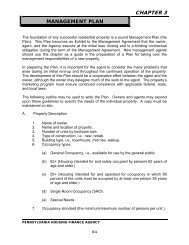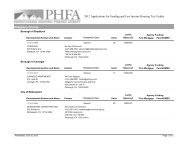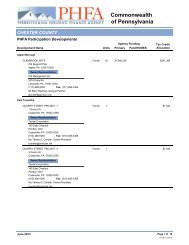PHFA Annual Report 2003 - Pennsylvania Housing Finance Agency
PHFA Annual Report 2003 - Pennsylvania Housing Finance Agency
PHFA Annual Report 2003 - Pennsylvania Housing Finance Agency
You also want an ePaper? Increase the reach of your titles
YUMPU automatically turns print PDFs into web optimized ePapers that Google loves.
42 43<br />
NOTES TO FINANCIAL STATEMENTS<br />
(in thousands of dollars)<br />
June 30, <strong>2003</strong> and 2002<br />
A. Authorizing Legislation<br />
The <strong>Pennsylvania</strong> <strong>Housing</strong> <strong>Finance</strong> <strong>Agency</strong> (“<strong>Agency</strong>”) is a corporate and political body created by the <strong>Housing</strong> <strong>Finance</strong><br />
<strong>Agency</strong> Law, Act of December 3, 1959, P.L. 1688 (“Act”), as amended. Pursuant to the Act, the <strong>Agency</strong> is authorized and<br />
empowered, among other things, to finance the construction and rehabilitation of housing units for persons and families of<br />
low and moderate income or the elderly. Bonds and notes issued under the provisions of the Act are not a debt or liability<br />
of the Commonwealth of <strong>Pennsylvania</strong> or any of its political subdivisions or a pledge of the faith and credit of the<br />
Commonwealth of <strong>Pennsylvania</strong> or of any of its political subdivisions.<br />
The Act was amended to authorize the <strong>Agency</strong> to make or purchase loans to finance the purchase, construction, improvement<br />
or rehabilitation of owner-occupied single family residences, and to finance the construction and rehabilitation of<br />
housing units without requiring the housing units to be subsidized or assisted by a federal government program.<br />
The <strong>Agency</strong> has been determined to be a component unit of the Commonwealth of <strong>Pennsylvania</strong> for financial reporting<br />
purposes and thus, the financial results of the <strong>Agency</strong> will be included in the Commonwealth’s June 30, <strong>2003</strong> financial<br />
statements.<br />
B. Fund Accounting<br />
The accounts of the <strong>Agency</strong> are organized on the basis of separate enterprise funds, each of which is considered to be a separate<br />
accounting entity with a separate set of self-balancing accounts that comprise its assets, liabilities, net assets, and revenues<br />
and expenses. The funds used by the <strong>Agency</strong> are described below.<br />
General Fund<br />
The General Fund is utilized to record certain loan origination fees, service fees and revenue from investments not specifically<br />
pledged for the repayment of notes or bonds in the other funds. All <strong>Agency</strong> expenses are recorded in this fund except<br />
interest, provisions for potential loan losses, and specific program expenses which are charged to the loan-related funds.<br />
Multi-Family Program<br />
The Multi-Family Program transactions relate to the construction, rehabilitation and permanent financing of multi-family<br />
rental housing developments generally designed for persons and families of low and moderate income or the elderly. The<br />
Multi-Family Program also provides funds for the bridge loan program. This program provides funds to multi-family construction<br />
projects, to be used as owner’s equity. These funds assist the construction project to finance pre-construction<br />
costs.<br />
Single Family Program<br />
The Single Family Program transactions relate to the purchase of mortgage loans for owner-occupied single family residences<br />
for persons and families of low and moderate income. Borrowers participating in the Single Family Program have<br />
the option of obtaining primary mortgage insurance through the <strong>Pennsylvania</strong> <strong>Housing</strong> Insurance Fund.<br />
Insurance Fund<br />
Through the Insurance Fund, the <strong>Agency</strong> provides primary mortgage insurance coverage for single family mortgage loans,<br />
and charges the participants a premium for this coverage.<br />
HEMAP<br />
The Homeowners Emergency Mortgage Assistance Program (“HEMAP”) was created by Act 91 of the General Assembly<br />
as a separate fund within the <strong>Agency</strong>. Transactions relate to the furnishing of emergency mortgage assistance to mortgagors<br />
facing foreclosure because of circumstances beyond their control, through the form of loans, in an amount sufficient to<br />
bring the mortgage current, and, if necessary, to provide continuing assistance for a period of up to 36 months. The mortgagor’s<br />
obligation to repay the loan does not commence until there is the financial ability to do so. As stated in Act 91, no<br />
<strong>Agency</strong> funds are being expended on HEMAP; however, it does rely on the <strong>Agency</strong> for various administrative services, for<br />
which it pays a support services fee.<br />
The <strong>Agency</strong> follows Governmental Accounting Standards Board (“GASB”) Statement No. 14, The <strong>Report</strong>ing Entity. As a<br />
result, HEMAP has been determined to be part of the reporting entity. Accordingly, HEMAP has been included as a separate<br />
fund in the financial statements. A separately published audit report of HEMAP is available for public inspection in<br />
the <strong>Agency</strong>’s <strong>Finance</strong> Department.<br />
Funding from repayments are estimated to continue to be sufficient to meet continuing loan program obligations and<br />
administrative costs. HEMAP is currently reviewing restructuring options, including legislative changes, that would make<br />
it self-sustaining or allow for a reduction of the appropriation.<br />
C. Summary of Significant Accounting Policies<br />
The financial statements have been prepared on the accrual basis. On this basis, revenues are recognized in the year in<br />
which they are earned and become measurable, and expenses are recognized in the year they are incurred.<br />
During the year ended June 30, 2002, the <strong>Agency</strong> adopted Governmental Accounting Standards Board (“GASB”)<br />
Statement No. 34, Basic Financial Statements and Management’s Discussion and Analysis. Statement No. 34 required<br />
changes to the presentation of the financial statements, but had no impact on the financial condition of the <strong>Agency</strong>. GASB<br />
Statement No. 34 requires the use of the term net assets rather than fund balance. Changes were made to separate current<br />
and noncurrent assets and liabilities within the balance sheet.<br />
Within the statement of revenues, expenses and changes in net assets, Statement No. 34 requires operating income and<br />
expenses to be separated from nonoperating income in order to show net operating income. Operating income and<br />
expenses are defined as those activities directly related to the <strong>Agency</strong>’s primary business objective of providing housing<br />
opportunities throughout the Commonwealth of <strong>Pennsylvania</strong>. <strong>PHFA</strong> has no nonoperating activities, however changes<br />
were made to highlight interest income and expense to facilitate financial statement analysis.<br />
The <strong>Agency</strong> follows GASB Statement No. 20, Accounting and Financial <strong>Report</strong>ing for Proprietary Funds and Other<br />
Governmental Entities That Use Proprietary Fund Accounting for reporting and disclosure purposes. As permitted by<br />
Statement No. 20, the <strong>Agency</strong> has elected to not apply Financial Accounting Standards Board pronouncements issued after<br />
November 30, 1989 unless the GASB specifically adopts the FASB Statement or Interpretation.<br />
Cash and Cash Equivalents<br />
For the purpose of the statements of cash flows, the <strong>Agency</strong> considers all highly liquid investments with an original maturity<br />
of three months or less to be cash equivalents.



